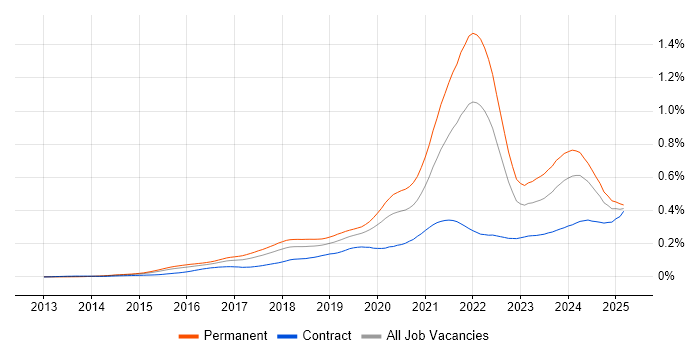Full-Stack Engineer
UK
The median Full-Stack Engineer salary in the UK is £70,000 per year, according to job vacancies posted during the 6 months leading to 6 May 2025.
The table below provides salary benchmarking and summary statistics, comparing them to the same period in the previous two years.
| 6 months to 6 May 2025 |
Same period 2024 | Same period 2023 | |
|---|---|---|---|
| Rank | 489 | 332 | 472 |
| Rank change year-on-year | -157 | +140 | -218 |
| Permanent jobs requiring a Full-Stack Engineer | 207 | 861 | 630 |
| As % of all permanent jobs advertised in the UK | 0.39% | 0.87% | 0.61% |
| As % of the Job Titles category | 0.43% | 0.92% | 0.67% |
| Number of salaries quoted | 182 | 348 | 339 |
| 10th Percentile | £44,125 | £43,750 | £52,500 |
| 25th Percentile | £57,500 | £52,500 | £62,500 |
| Median annual salary (50th Percentile) | £70,000 | £65,000 | £80,000 |
| Median % change year-on-year | +7.69% | -18.75% | +3.23% |
| 75th Percentile | £85,253 | £92,500 | £100,000 |
| 90th Percentile | £117,500 | £115,000 | £120,000 |
| UK excluding London median annual salary | £60,000 | £60,000 | £65,351 |
| % change year-on-year | - | -8.19% | +4.56% |
All Permanent IT Job Vacancies
UK
For comparison with the information above, the following table provides summary statistics for all permanent IT job vacancies. Most job vacancies include a discernible job title that can be normalized. As such, the figures in the second row provide an indication of the number of permanent jobs in our overall sample.
| Permanent vacancies in the UK with a recognized job title | 48,283 | 93,229 | 94,684 |
| % of permanent jobs with a recognized job title | 90.44% | 94.63% | 91.53% |
| Number of salaries quoted | 27,442 | 66,845 | 59,589 |
| 10th Percentile | £30,000 | £28,500 | £32,500 |
| 25th Percentile | £42,000 | £38,500 | £45,000 |
| Median annual salary (50th Percentile) | £57,500 | £52,500 | £60,000 |
| Median % change year-on-year | +9.52% | -12.50% | - |
| 75th Percentile | £75,000 | £71,250 | £81,250 |
| 90th Percentile | £97,500 | £90,000 | £100,000 |
| UK excluding London median annual salary | £52,000 | £50,000 | £53,000 |
| % change year-on-year | +4.00% | -5.66% | +6.00% |
Full-Stack Engineer
Job Vacancy Trend
Job postings that featured Full-Stack Engineer in the job title as a proportion of all IT jobs advertised.

Full-Stack Engineer
Salary Trend
3-month moving average salary quoted in jobs citing Full-Stack Engineer.
Full-Stack Engineer
Salary Histogram
Salary distribution for jobs citing Full-Stack Engineer over the 6 months to 6 May 2025.
Full-Stack Engineer
Top 15 Job Locations
The table below looks at the demand and provides a guide to the median salaries quoted in IT jobs citing Full-Stack Engineer within the UK over the 6 months to 6 May 2025. The 'Rank Change' column provides an indication of the change in demand within each location based on the same 6 month period last year.
| Location | Rank Change on Same Period Last Year |
Matching Permanent IT Job Ads |
Median Salary Past 6 Months |
Median Salary % Change on Same Period Last Year |
Live Jobs |
|---|---|---|---|---|---|
| England | -53 | 194 | £70,000 | - | 357 |
| London | +61 | 112 | £75,000 | -16.67% | 233 |
| Work from Home | +114 | 95 | £70,000 | +10.24% | 254 |
| UK excluding London | -194 | 87 | £60,000 | - | 175 |
| North of England | -9 | 26 | £57,500 | -4.17% | 56 |
| South West | +102 | 19 | £61,250 | +22.50% | 15 |
| South East | +37 | 17 | £65,000 | +8.33% | 63 |
| Yorkshire | +82 | 13 | £50,000 | +11.11% | 17 |
| North West | -60 | 13 | £60,000 | - | 36 |
| Midlands | -27 | 12 | £52,500 | -10.26% | 15 |
| West Midlands | +48 | 11 | £52,500 | -12.50% | 6 |
| East of England | +38 | 6 | £60,000 | -4.00% | 17 |
| Scotland | -84 | 5 | £79,569 | +32.62% | 6 |
| Wales | +26 | 2 | £80,000 | +33.33% | 4 |
| East Midlands | -34 | 1 | - | - | 9 |
Full-Stack Engineer Skill Set
Top 30 Co-occurring Skills and Capabilities
For the 6 months to 6 May 2025, Full-Stack Engineer job roles required the following skills and capabilities in order of popularity. The figures indicate the absolute number co-occurrences and as a proportion of all permanent job ads featuring Full-Stack Engineer in the job title.
|
|
Full-Stack Engineer Skill Set
Co-occurring Skills and Capabilities by Category
The follow tables expand on the table above by listing co-occurrences grouped by category. The same employment type, locality and period is covered with up to 20 co-occurrences shown in each of the following categories:
|
|
||||||||||||||||||||||||||||||||||||||||||||||||||||||||||||||||||||||||||||||||||||||||||||||||||||||||||||||||||||||||
|
|
||||||||||||||||||||||||||||||||||||||||||||||||||||||||||||||||||||||||||||||||||||||||||||||||||||||||||||||||||||||||
|
|
||||||||||||||||||||||||||||||||||||||||||||||||||||||||||||||||||||||||||||||||||||||||||||||||||||||||||||||||||||||||
|
|
||||||||||||||||||||||||||||||||||||||||||||||||||||||||||||||||||||||||||||||||||||||||||||||||||||||||||||||||||||||||
|
|
||||||||||||||||||||||||||||||||||||||||||||||||||||||||||||||||||||||||||||||||||||||||||||||||||||||||||||||||||||||||
|
|
||||||||||||||||||||||||||||||||||||||||||||||||||||||||||||||||||||||||||||||||||||||||||||||||||||||||||||||||||||||||
|
|
||||||||||||||||||||||||||||||||||||||||||||||||||||||||||||||||||||||||||||||||||||||||||||||||||||||||||||||||||||||||
|
|
||||||||||||||||||||||||||||||||||||||||||||||||||||||||||||||||||||||||||||||||||||||||||||||||||||||||||||||||||||||||
|
|||||||||||||||||||||||||||||||||||||||||||||||||||||||||||||||||||||||||||||||||||||||||||||||||||||||||||||||||||||||||
